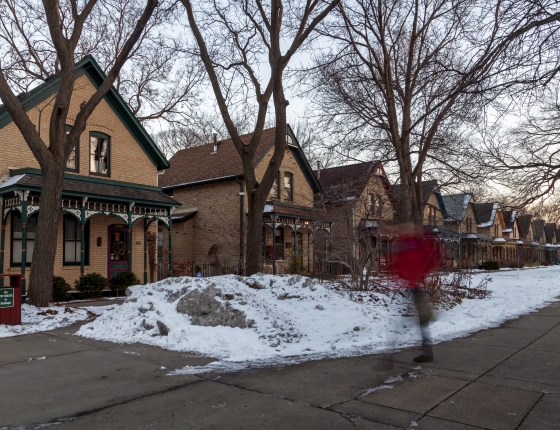This post complements our quarterly research newsletter, which features updates on CEE's research projects. Sign up to get this information in your inbox.
Heat Pump Rooftop Units (ETA Initiative)
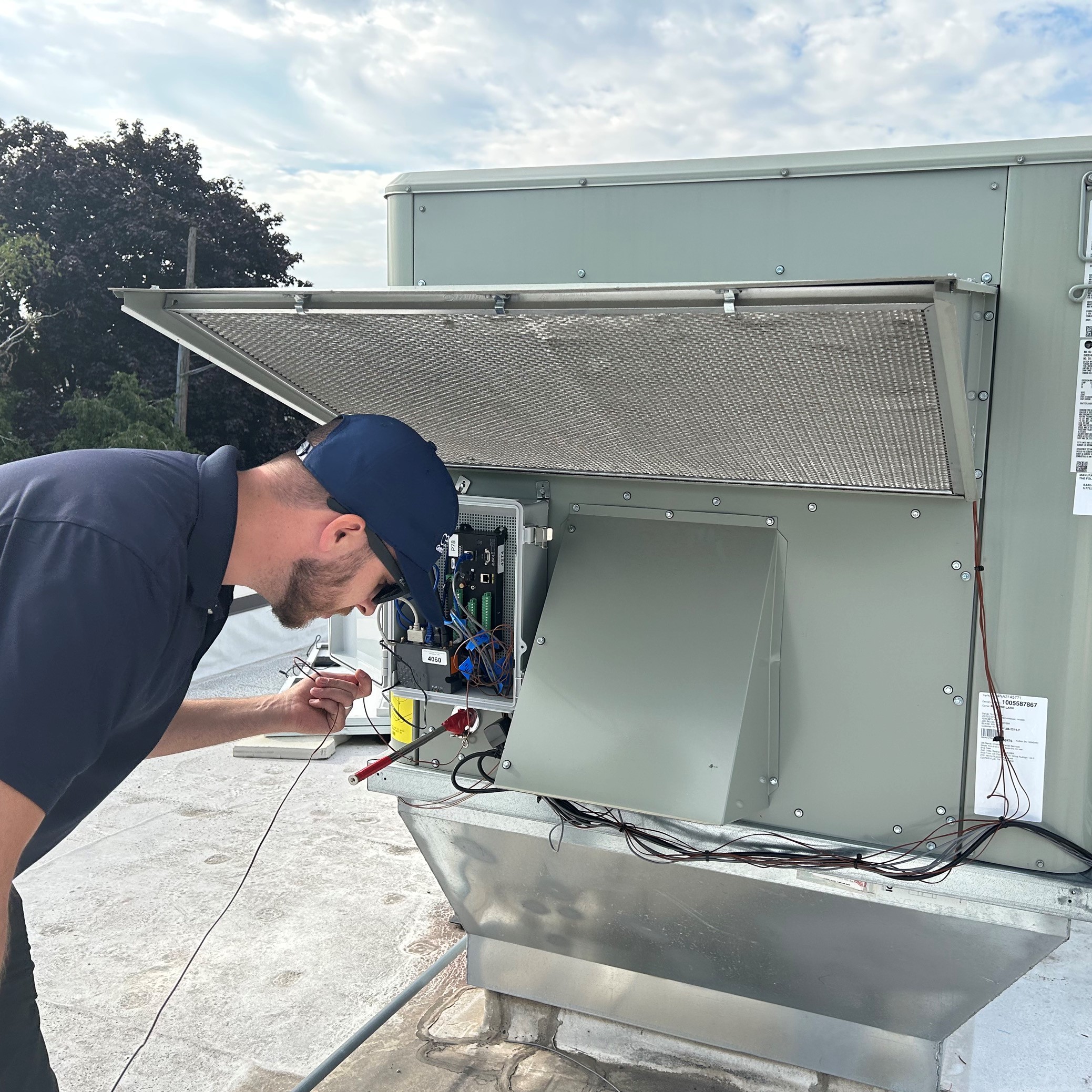 Background: Minnesota’s Efficient Technology Accelerator (ETA) is a statewide market transformation program, implemented by CEE, that accelerates deployment and reduces the cost of emerging and innovative efficient technologies. As part of the initial portfolio of ETA technologies, CEE staff will be researching and promoting advances in heat pump rooftop units (RTUs) for commercial buildings. While heat pump RTUs come in many configurations, dual fuel heat pump RTUs are of particular interest in cold climates, as they contain a natural gas furnace and efficient heat pump in the same package. Since dual fuel systems can use both gas and electricity for space heating, they can be configured to minimize energy use, emissions, or operating costs while keeping buildings comfortable across the full range of winter conditions.
Background: Minnesota’s Efficient Technology Accelerator (ETA) is a statewide market transformation program, implemented by CEE, that accelerates deployment and reduces the cost of emerging and innovative efficient technologies. As part of the initial portfolio of ETA technologies, CEE staff will be researching and promoting advances in heat pump rooftop units (RTUs) for commercial buildings. While heat pump RTUs come in many configurations, dual fuel heat pump RTUs are of particular interest in cold climates, as they contain a natural gas furnace and efficient heat pump in the same package. Since dual fuel systems can use both gas and electricity for space heating, they can be configured to minimize energy use, emissions, or operating costs while keeping buildings comfortable across the full range of winter conditions.
Update: The first site for conducting heat pump RTU research has been identified at a dental office in northeast Minneapolis. Two-thirds of the conventional RTUs at the site were replaced with heat pumps RTUs during an office remodel that highlighted how the modularity of conventional RTUs extends to heat pump RTUs as well. The research team is currently monitoring the energy consumption, heating performance, and efficiency of two heat pump RTUs at the site through this heating season. So far, the team has observed successful transitions between heat pump and back-up gas heating at temperatures below the heat pump’s switchover setpoint and has begun characterizing the efficiency of the heat pump as a function of temperature. Heating season performance reports will be compiled and released this spring.
Do you know of a site that has a recently installed heat pump RTU and would be interested in taking part in this study?
Email our research team
Minnesota's Efficient Technology Accelerator is funded by investor-owned utilities and administered by the Minnesota Department of Commerce, Division of Energy Resources.
Optimized Installations of ASHPs
Background: 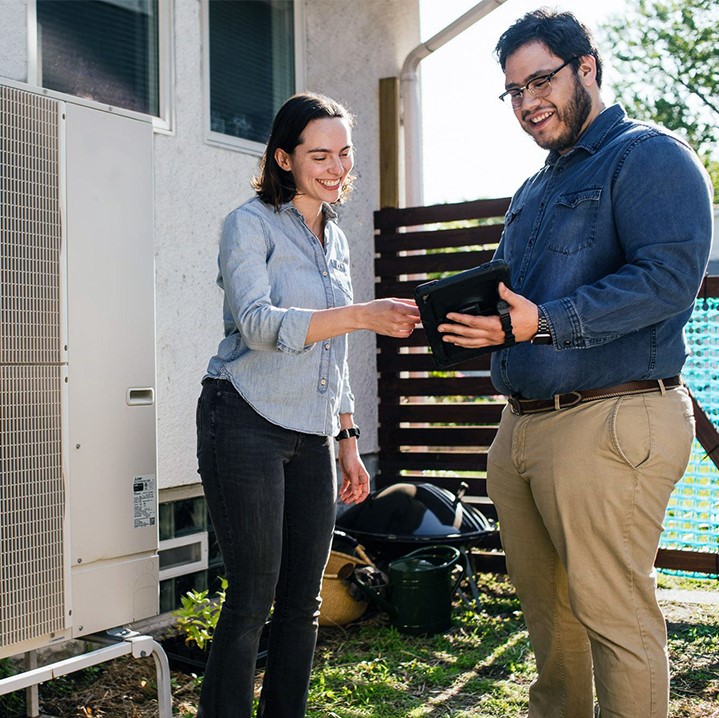 The 2018 CARD Minnesota Energy Efficiency Potential Study identified cold climate air source heat pumps (ASHPs) as the technology expected to provide 25% of total residential electrical savings in the state in the coming decade. These two projects, one on single-family and the other on multifamily homes, set out to develop and validate design, installation, and operational protocols necessary for cold climate ASHPs to achieve wide market acceptance and maximum energy savings.
The 2018 CARD Minnesota Energy Efficiency Potential Study identified cold climate air source heat pumps (ASHPs) as the technology expected to provide 25% of total residential electrical savings in the state in the coming decade. These two projects, one on single-family and the other on multifamily homes, set out to develop and validate design, installation, and operational protocols necessary for cold climate ASHPs to achieve wide market acceptance and maximum energy savings.
Update: Both projects are nearing their conclusion with similar findings on the importance of quality ASHP installation and design. There are so many possible configurations that it is vital to map and match heat pump solutions onto existing heating system conditions for cost-effective and energy efficient results. This represents a departure from how HVAC systems are typically updated, therefore will require sufficient contractor education and training. Many design questions are around zoning and control, with the goal of marrying the best performance and cost with how the unit is serving the consumer. CEE research staff presented a CARD webinar this winter on the single-family project, which can be viewed at the link below. The multifamily project will be featured in a webinar this spring.
Visit the multifamily project page
Visit the single-family project page
Watch the single-family project webinar
These projects are supported by a grant from the Minnesota Department of Commerce, Division of Energy Resources through the Conservation Applied Research and Development (CARD) program, which is funded by Minnesota ratepayers.
Discovering Air-to-Water Heat Pumps
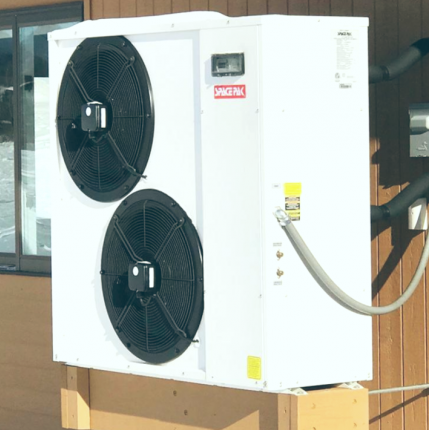 Background: An alternative heat pump technology — the air-to-water heat pump (AWHP), a new variant of an air source heat pump — uses electricity to move heat from outdoor air into indoor water. These systems are compatible with low-temperature radiant heating, domestic hot water heating, and forced-air heating and cooling. This project is a field study of AWHPs to characterize and evaluate their efficiency, performance, and cost-effectiveness.
Background: An alternative heat pump technology — the air-to-water heat pump (AWHP), a new variant of an air source heat pump — uses electricity to move heat from outdoor air into indoor water. These systems are compatible with low-temperature radiant heating, domestic hot water heating, and forced-air heating and cooling. This project is a field study of AWHPs to characterize and evaluate their efficiency, performance, and cost-effectiveness.
Update: The project team presented a CARD webinar in December on key project findings — the webinar recording is now available on CEE’s website. The project identified dozens of AWHP models and configurations that are available for a variety of Minnesota residential applications. For systems field-tested in this study, the AWHPs produced 6,300 to 16,600 kWh and $453 to $1,450 savings per year. The project team recommends aligning this subset of ASHP technology with existing ECO models and programs and advocates for standardized ratings for AWHP systems to promote the technology as a flexible and effective heat pump solution.
This project is supported by a grant from the Minnesota Department of Commerce, Division of Energy Resources through the Conservation Applied Research and Development (CARD) program, which is funded by Minnesota ratepayers.
VSHP as an AC Replacement
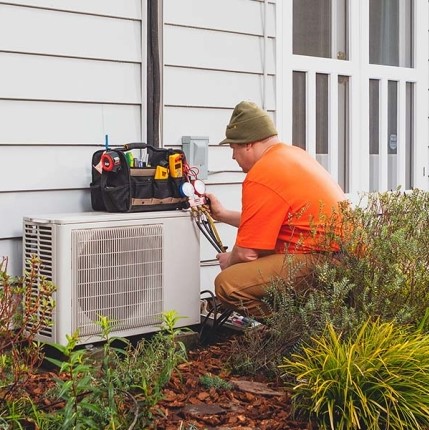 Background: Variable speed heat pumps (VSHPs) save energy on both heating and cooling and offer greater year-round comfort. Recent advances in this technology provide opportunities to dramatically reduce installation costs and allow for a smoother transition to VSHPs from traditional heating and cooling systems. This field study assessed energy savings that can be achieved by installing cold climate variable speed heat pumps as replacements to central air conditioning (AC) equipment in residential customers’ homes in ComEd’s service territory.
Background: Variable speed heat pumps (VSHPs) save energy on both heating and cooling and offer greater year-round comfort. Recent advances in this technology provide opportunities to dramatically reduce installation costs and allow for a smoother transition to VSHPs from traditional heating and cooling systems. This field study assessed energy savings that can be achieved by installing cold climate variable speed heat pumps as replacements to central air conditioning (AC) equipment in residential customers’ homes in ComEd’s service territory.
Update: The results from this study strongly support using heat pumps any time an AC replacement is needed to unlock more energy efficiency in shoulder seasons. New coil-only VSHPs can be installed on any existing furnace set-up with encouraging results. The findings from this study were discussed in a recent webinar, linked below. The project team is compiling a final report and will be presenting on the topic at the ACEEE 2024 Hot Air Forum in March and the ACEEE 2024 Summer Study in August.
This project is funded by ComEd's Customer Innovation Program.
